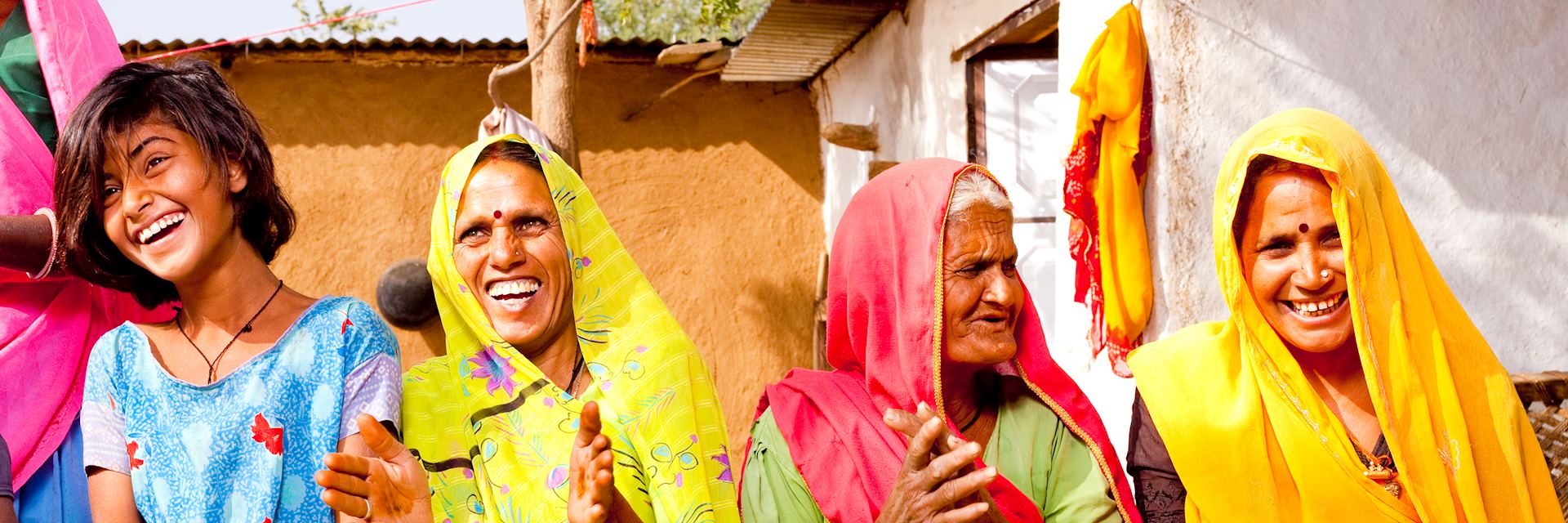Practical Information
Our huge enthusiasm for India stems from its endless diversity, and we use our knowledge of the different states, sites and hotels to plan the most rewarding experiences for you based on your own preferences.
We recommend focusing on one or two areas at a time, spending a couple of nights in each place so you have time to explore with your private guide and by yourselves.
Away from the main routes we know a number of families who will invite you into their homes, where you can learn about everything from the price of tea to cooking chapatis.
Accommodation
Its rich history has bequeathed India with a wonderful choice of hotels, and our regular visits allow us to find the best accommodation to enhance your experience.
Many of the royal families of Rajasthan have opened their doors, and converted palaces in the cities as well as those throughout the Aravalli Hills allow you to absorb the regal atmosphere. Such has been their popularity, 'new palaces' have been constructed — largely by The Oberoi Group — with an emphasis on luxury and high quality service.
As well as the luxury hotels there are boutique spas, converted tea planters’ cottages, hill station retreats and beach bungalows.
Language
The official language is Hindi which is spoken by about 30% of the population. English is often used for official or commercial purposes. In addition, there are 17 regional languages which include Punjabi, Bengali, Gujarati and Oriya which are widely used in the north and Tamil and Telegu which are common in the south. Other regional languages are Marathi, Kannada and Malayalam. The northern Muslim population largely speak Urdu.
Food & Drink
There is a huge variety of dishes across India, with combinations of spices giving each region its own distinctive flavour. Seafood is a speciality in the coastal areas and coconut is used in many Keralan dishes in the south. A variety of European and Chinese dishes can usually be found at 4-5 star hotels. Local brands of drinks are widely available and international brands in larger hotels although these can be expensive, so you might like to bring additional duty free to combat this. Alcohol is not available in certain holy towns such as Pushkar and Hampi and the first day of each month is a 'dry' day in Cochin.
Tipping
Tipping for good service is expected in India and should preferably be paid in local currency. As a general rule we recommend the following tipping guidelines. All are per couple: guides around 300-500 Rs per half day tour, or 300-700 Rs per day. Accompanying tour escort 500-1000 Rs per day. For a driver who accompanies you throughout your tour we recommend 400-600 Rs per day and 200-500 Rs for a local driver.
In national parks: naturalist 200-500 Rs per game drive, driver 150 Rs per drive, and government guide 100 Rs. All suggestions are per couple.
Hotel porters are usually given around 20-50 Rs per bag (more in luxury hotels). A 10% tip is appreciated in restaurants and for room service, when no service charge is added to the bill. In some hotels, particularly in Kerala, and at homestays a communal Tip Box is often provided, usually in Reception. At homestays/camps house staff can be tipped around 500 Rs per day between a couple. Please give your tip to your host to distribute fairly if a Tip Box is not provided.
Obviously this is very much a rough guide and you are completely free to give whatever you feel is appropriate. You can also tip in US dollars if you need to, please check the exchange rate at time of travel.
Money & Expense
Rupee (Rs). Notes are in denominations of Rs1000, 500, 100, 50, 20, 10 and 5. The 500 and 100 notes are similar in colour. Larger notes can be difficult to change outside of big cities. Coins are in denominations of Rs5, 2 and 1, and also 50 and 20 paise (100paise = 1 rupee). Currency can only be changed at banks or authorised money changers in India, including hotel cashiers. Try and obtain some low denominations for small purchases and tips. Both US dollar and GB sterling cash and travellers' cheques are accepted. ATMs are available in major cities and credit cards can usually be used for payment at larger shops and hotels. Allow about £10-30 a day for meal expenses.
Social Conventions & Etiquette
The Prohibition Of Smoking in Public Places Rules came into effect from October 2, 2008; smoking is banned in all public areas of hotels including restaurants and bars. Anyone found violating the rule faces a punishable offence and is likely to meet with a monetary penalty.
Scant, tight clothing will draw unwanted attention and offend local sensibilities. Displays of intimacy are not considered acceptable in public. Visitors to all religious places should be dressed in clean, modest clothes; shorts and vests are inappropriate.
Always remove shoes before entering a temple or mosque (and all leather items in Jain temples) It is a good idea to carry a pair of socks to wear on hot stone floors.
In Buddhist shrines, turn prayer wheels in a clockwise direction. In Sikh gurudwaras, everyone should cover their head, even if it is just with a handkerchief. Tobacco and cigarettes should not be taken in.
Do not take pictures of people without asking permission. Photography within airports, of military installations, bridges and at "sensitive" border areas are not permitted.
Travel Advice
Our country specialists can advise on any safety concerns you may have. For current information, please refer to the Foreign, Commonwealth & Development Office website.
When to go to India
You'll find temperature and rainfall information, together with a month-by-month guide on visiting, on our guide for when to go to India.
More Information
-
Flight Time
8½ hours (New Delhi) -
Recommended Airlines
British Airways, Emirates, Etihad, KLM, Qatar Airways, Turkish Airlines -
Time Zone
UTC +5:30
